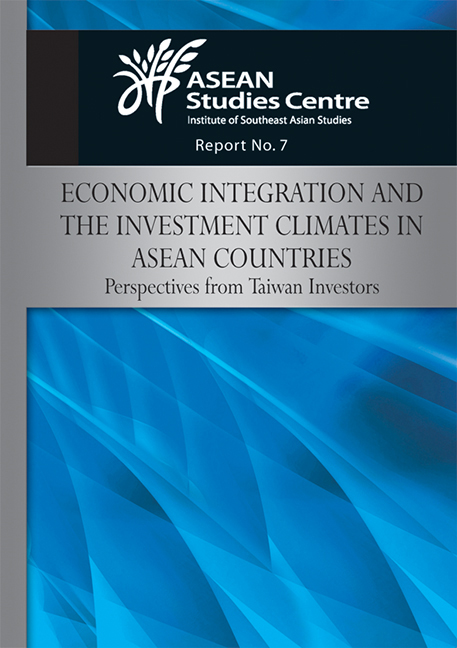 Economic Integration and the Investment Climates in ASEAN Countries
Economic Integration and the Investment Climates in ASEAN Countries Book contents
- Frontmatter
- Contents
- Introduction
- I Economic Integration and the Investment Climates in ASEAN Countries: Perspectives from Taiwan Investors
- Background of the Symposium
- Opening Remarks
- Session 1
- Session 2
- Session 3
- Questions and Answers
- Conclusion and Policy Suggestions
- II Background Papers
- Annex I: Programme of the Symposium
Conclusion and Policy Suggestions
from I - Economic Integration and the Investment Climates in ASEAN Countries: Perspectives from Taiwan Investors
Published online by Cambridge University Press: 21 October 2015
- Frontmatter
- Contents
- Introduction
- I Economic Integration and the Investment Climates in ASEAN Countries: Perspectives from Taiwan Investors
- Background of the Symposium
- Opening Remarks
- Session 1
- Session 2
- Session 3
- Questions and Answers
- Conclusion and Policy Suggestions
- II Background Papers
- Annex I: Programme of the Symposium
Summary
50. Dr Michael Hsiao concluded by saying that for ASEAN-Taiwan relations, there existed many issues from both the research and political angles. However, for now the focus was on ASEAN economic integration and how it might affect the Taiwanese business people in the long run. While this symposium had taken a first step by raising the awareness of a small group of people, more needed to be discussed in the future.
51. Mr Rodolfo Severino gave a few policy suggestions: (1) To strengthen ASEAN-Taiwan relations, a Taiwan-ASEAN business council could be formed among Taiwanese companies doing business in ASEAN. Although many small and medium enterprises might not be ready for this, it could help ASEAN to shape trade and investment policies that would be more favourable to Taiwanese investors. It might also push domestic reforms in ASEAN countries. (2) ASEAN might also need to upgrade or change its educational system so as to fit the needs of the Taiwanese manufacturing sector in the region. Moreover, the education of Taiwanese children in ASEAN should be given important consideration. (3) ASEAN also needed to provide appropriate medical facilities for migrant Taiwanese workers. (4) There were also some gaps in research in areas such as studies on the social situation of Taishang in ASEAN countries. (5) Information from ASEAN countries was needed in terms of infrastructure, labour laws, taxation policy, etc. This information should be available in Chinese, as many Taiwanese investors had limited grasp of the English language.
52. Mr Severino suggested some themes for future symposiums. A survey had been done by a Taiwanese institute on Taishang in ASEAN. The findings would be available by the third quarter of 2009. So the next symposium could focus on these findings and could have attendees from the ASEAN Secretariat, Taishang and other knowledgeable people from ASEAN and Taiwan. This could be arranged sometime in late 2009 in Singapore.
53. Dr David Hong from TIER suggested a few other areas that required discussion: (1) labour mobility between ASEAN and Taiwan; (2) ASEAN's production chain and the division of labour; and (3) regional tourism cooperation.
- Type
- Chapter
- Information
- Economic Integration and the Investment Climates in ASEAN CountriesPerspectives from Taiwan Investors, pp. 20 - 22Publisher: ISEAS–Yusof Ishak InstitutePrint publication year: 2009


